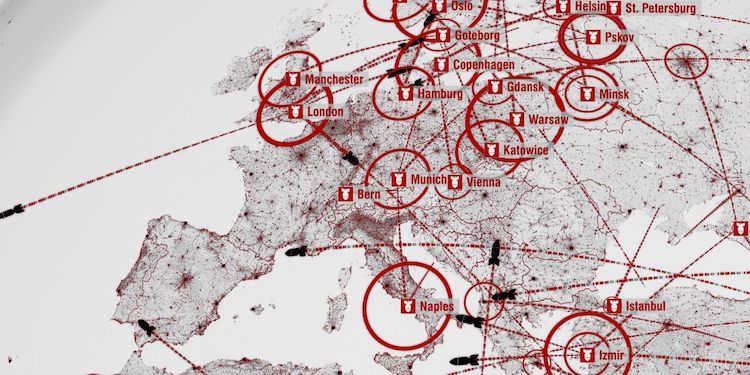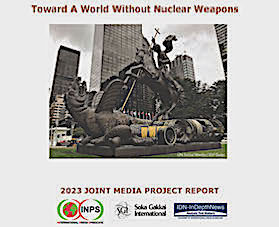Viewpoint by Herbert Wulf
This article was issued by the Toda Peace Institute and is being republished with their permission.
BONN (IDN) — Russia’s repeated references to nuclear weapons since it started the war in Ukraine have put nuclear weapons back at the centre stage of the strategic discussions. This has raised anxieties about a possible nuclear war in Europe, and it is a setback for nuclear arms control. [2022-07-26]
Unfortunately, the Russian mindset has had a fall-out effect: NATO re-emphasises the need for nuclear deterrence, particularly its nuclear sharing programmes in Europe.
Shortly after the beginning of the war, President Vladimir Putin put the nuclear forces on high alert. Now, after a few comments over the last months by Foreign Minister Sergej Lavrov, ex-President Dmitry Medvedev followed suit and warned against nuclear war in connection with the International Criminal Court's investigation into possible war crimes in Ukraine: "The idea of punishing a country that has the largest nuclear arsenal is absurd. And potentially poses a threat to the existence of humanity.”
What is Russia aiming at with repeated references to nuclear weapons? Is it a serious threat? Is the aim to prevent the West from further support for Ukraine? Or is there even a danger of nuclear war in Europe?
Governments and people in Europe are once again discussing the role of nuclear weapons. On several occasions, top politicians from NATO countries have pointed out that the nuclear deterrence strategy continues to apply and that the concept of European nuclear sharing will not be given up under any circumstances.
Suddenly, the Europeans feel they are confronted again with a life-threatening conflict between a nuclear-armed Russia and the nuclear alliance of NATO. This is an unfortunate set-back for the drive to eliminate nuclear weapons.
The system of nuclear sharing was originally conceived in the early stages of the Cold War to prevent the proliferation of nuclear weapons among Western allies. It is supposed to ensure, according to NATO, that “benefits, responsibilities and risks of nuclear deterrence are shared across the Alliance.”
European strategists hope that caring about sharing will engage the US more closely in Europe's security. It is estimated that between 100 and 150 American B61 nuclear weapons are stationed in five countries: Belgium, Germany, Italy, the Netherlands and Turkey. NATO has now announced its desire to modernise its nuclear deterrence.
The situation was very different before the war began. Nuclear weapons were not on the political agenda and not on the minds of people and the initiatives by non-nuclear states and the agreement on the Treaty on the Prohibition of Nuclear Weapons (TPNW) gave hope for an elimination of all nuclear weapons. There have always been two opposing positions on nuclear deterrence and the two positions are religiously opposed to each other.
Before the start of the Ukraine war, there were serious discussions in four of the five nuclear sharing countries about an end to this system and the withdrawal of US nuclear weapons. Nuclear sharing was perceived as a relic of the Cold War. Only Turkey went the opposite way. President Recep Tayyip Erdogan said in 2019 that it was unacceptable that nuclear-weapon states wanted to ban Ankara from developing its own nuclear weapons. He left open whether Turkey had concrete plans for an independent Turkish nuclear option.
The governments in the other four nuclear-sharing countries, Belgium, Germany, Italy and the Netherlands, have pointed out that they are in favour of a nuclear-free world, although they refrained from joining the Treaty on the Prohibition of Nuclear Weapons (TPNW) and challenging the nuclear-sharing agreement.
However, all four countries have had serious debates about the withdrawal of the US-nuclear weapons, both in parliaments and in the public. Public opinion in Belgium, Netherlands and Italy was strongly in favour of joining the TPNW, while in late 2021 57% of Germans wanted the withdrawal of nuclear weapons from Germany.
The war in Ukraine has dramatically changed this picture. According to the Spring 2022 survey “Eurobarometer” of the European Parliament, most citizens prioritise defence effort now. In Germany, only 39 per cent voted for the withdrawal of US nuclear weapons. Asked about the role of nuclear weapons at the recent NATO summit in Madrid, German Chancellor Olaf Scholz muted a possible debate with two laconic sentences: "NATO has had a strategy here for years that it continues to pursue. This is something we are continuing as we have been doing for decades."
None of the critics of nuclear sharing in Olaf Scholz's social democratic party, SPD, opposed this position publicly. In practice, the German government is joining this nuclear arms race with the acquisition of new US nuclear-capable F-35 fighter jets. After years of controversial debate and a lengthy discussion about Germany’s continued participation in nuclear sharing, this procurement was decided within a few days after Russia’s invasion of Ukraine.
NATO officials were enthusiastic about the widely shared willingness to modernise the nuclear sharing concept. Jessica Cox, Chief of NATO’s nuclear policy directorate said: “We’re moving fast and furiously towards F-35 modernization and incorporating those into our planning and exercising…” And she added that “the aircraft’s advanced features also will boost the capabilities of alliance members and F-35 customers like Poland, Denmark or Norway who might be tasked with supporting actual nuclear sharing missions.”
Now it's not just Turkey that is thinking about its own nuclear options. Will most or even all of NATO’s members eventually be part of the nuclear sharing arrangements? The voices in Europe are getting louder. The President of the European People's Party (EPP), Manfred Weber, said in an interview: "We must now also talk about the nuclear option."
And the head of the Munich Security Conference, Christoph Heusgen, opted for the strengthening of European security and says: "With regard to the nuclear umbrella, we must enter into talks with France..." French President Emmanuel Macron, who repeatedly called for the “strategic autonomy” of the EU offered a dialogue in early 2020 on France's nuclear deterrent with "our European partners who are ready to do so." At the time, Macron received no affirmative response from the partners and his position seems incompatible with US-European nuclear sharing arrangements.
The present trend for further escalation should not prevent us from soberly assessing the nuclear dimension, which still guarantees “mutually assured destruction”. Therefore, the nuclear sharing debate and nuclear arms control should be put back on the table to calm relations with Russia. This should not be left to bilateral US-Russia relations. An initiative by European governments would be helpful.
Russia’s fumbling with the nuclear arsenal has reopened the debate on the role of nuclear weapons in Europe. Although governments are still pointing out the need for nuclear arms control and disarmament initiatives, in reality, the switch has been flipped towards upgrading and modernising the arsenals.
The sceptical mood of the past questioning the utility of nuclear weapons in Europe has turned into a pro-nuclear deterrent position. This is deeply disappointing to all those who would prefer a nuclear free option.
Already before the war in Ukraine the tense relations between the US and Russia had brought many bilateral arms control regimes to a halt and the Covid-19 pandemic postponed the urgently needed discourse on nuclear weapons. But there is still hope that other initiatives, especially the TPNW and the upcoming tenth review conference of the NPT, will put new life into the nuclear arms control agenda. [IDN-InDepthNews – 26 July 2022]
Herbert Wulf is a Professor of International Relations and former Director of the Bonn International Center for Conflict Studies (BICC). He is presently a Senior Fellow at BICC, an Adjunct Senior Researcher at the Institute for Development and Peace, University of Duisburg/Essen, Germany, and a Research Affiliate at the National Centre for Peace and Conflict Studies, University of Otago, New Zealand. He serves on the Scientific Councils of SIPRI and the Centre for Conflict Studies of the University of Marburg, Germany.
Image: Trzmiel/Shutterstock
Original link: https://toda.org/global-outlook/caring-about-nuclear-sharing-a-set-back-for-nuclear-arms-control.html













